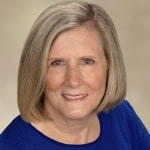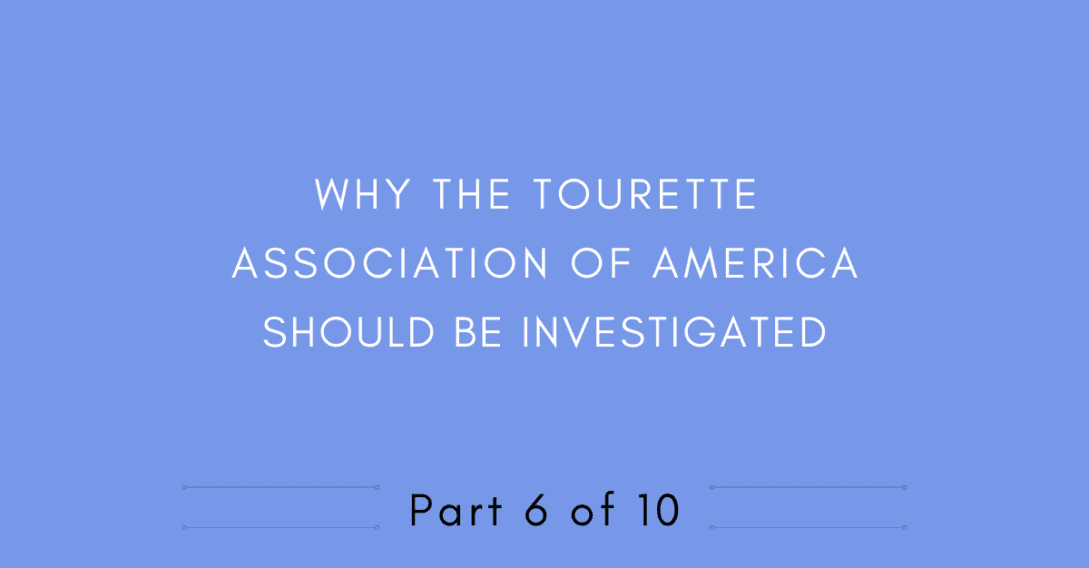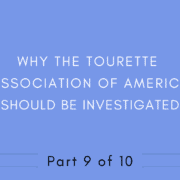Why the Tourette Association of America Should Be Investigated: Part 6
 Sheila Rogers DeMare, Director Association for Comprehensive NeuroTherapy
Sheila Rogers DeMare, Director Association for Comprehensive NeuroTherapy
The TAA/TSA medical board ignored the findings of the Alternative Therapy Network for Tourette syndrome even while TSA staff referred families to it and success stories with natural treatments were mutually shared.
This part of the series focuses on the work of a determined parent, Ginger Wakem, who started “The Alternative Therapy Network” for Tourette syndrome. Ginger initiated her efforts after experiencing the joy of seeing her son Griffin’s severe Tourette syndrome symptoms controlled without the use of standard medications. Her network eventually grew into the Association for Comprehensive NeuroTherapy (ACN Latitudes.) Our book Natural Treatments for Tics and Tourette’s: A Patient and Family Guide includes a summary of Griffin’s case. Below is an excerpt:
In 1986, Ginger Wakem and her husband were desperately dealing with their son’s Tourette syndrome symptoms. Griffin had developed normally and was clearly bright. He seemed healthy, but when he was six years old, he developed some mild tics. By the fourth grade, something had gone terribly wrong. His mother recalls, “Griffin disrupted his gifted classes with ear-splitting shrieks. He made noises, kicked desks, and waved his arms. He involuntarily beat his chest so hard with both fists that he damaged the lining of his lungs.” After a trip to the emergency department one night, his parents began taping a foam pad to his T-shirt to cushion his chest.
“For six weeks,” Ginger said, “the tics were so bad that Griffin couldn’t even hold a pencil. He was depressed and wished he were dead. And all this was while he was on medication.”
Students taunted Griff, and at home the family struggled to deal with temper tantrums and mood swings. Tourette’s had snatched Ginger and Peter Wakem’s talented, sweet-natured boy and given them a nightmare in return.
Positive results at last: After taking Griffin to different neurologists and to a psychiatrist, Ginger went into therapy herself to deal with the stress. The following year, a friend recommended that she take her son to an environmental physician.
To the family’s amazement, Griffin was found during testing to have an allergic reaction to corn, egg, and milk—each of which caused different tic symptoms. More testing showed that beet and cane sugar could bring on shrieks, aggressive behavior, and loss of concentration. His eyes itched in response to the introduction of wheat, he sneezed as a reaction to chicken, and he was unable to hold a pencil when tested for tomato. Apple and chocolate brought on some of the worst tics. Griffin was also hypersensitive to certain dusts, molds, pollens, and chemicals. Laboratory work revealed nutritional imbalances. The highly reactive state that Griffin exhibited is considered unusual and has been referred to as “exquisite sensitivity.” (More here).
The tics soon started to subside through allergy treatment along with environmental changes and dietary interventions. It wasn’t an easy undertaking to make the lifestyle and dietary adjustments, but Ginger worked hard at it. Griffin’s symptoms continued to improve. No Tourette medication was used, and the family rejoiced knowing he was on the way to recovery.
Wanting to spread the word to families and doctors about the allergy connection and Griffin’s success story, Ginger spent evenings on the phone networking, and mailed information to doctors, TSA support groups, and interested families. For a while, TSA literature carried her story, and if someone contacted the TSA for information on non-drug therapies, they were referred to Ginger. As other success stories arose with varying degrees of improvement, those were also shared. All the while she was running a business and raising teenagers.
“It was very labor intensive, and I felt like I was doing the work the TSA should have done. What bothered me most was that I couldn’t get through to the TSA. I had been willing to take up the cause. But I was losing the battle if I couldn’t get the physicians on the TSA boards to listen, since they were the ones controlling the message. They never changed their stance on recognizing the role of allergy. They never alerted families to the fact that there were things they could try that might make a difference for their child.”
Griffin’s schooling had been disrupted, so he took his GED, getting a perfect score. He started his own successful business before his classmates had even been graduated from high school. Ginger said she taught him not to let the Tourette syndrome label limit or define him. Today Griffin is 36 and a Senior Linux Engineer. Ginger adds, “We joke that he is the one who makes the ‘big bucks.’ He is married, with one son and one on the way. He has a healthy lifestyle and is doing very well. He fully understands what triggered his symptoms.”
Ginger passes the baton
I was working as a school psychologist in Palm Beach County, Florida when I learned about Ginger’s network. When I contacted her, she explained that she was discouraged by the TSA doctors’ lack of action and exhausted from the effort of running the network. She’d heard from others who’d also been treated by environmental physicians and filled me in on Dr. Marshall Mandells’ research. As Dr. Mandell pointed out, the approach did not work for everyone, and those who responded positively had varying degrees of improvement.
Buoyed with confidence, I told Ginger I would carry on her work. Surely within a couple of years my task would be done: the word would be out to the public that for some people there was an allergy connection to Tourette syndrome. Knowing this could change their lives forever.
Unfortunately I was wrong on both counts. Most conventional doctors were either negative or did not respond at all. And my timeline was off by more than twenty years.
Eleanor Pearl
Eleanor Pearl and her husband Bill founded the TSA in 1972. Mrs. Pearl believed in holistic approaches to Tourette’s and she privately encouraged our efforts; she passed away several years ago. Her daughter-in-law, Sue Levi-Pearl, was our main TSA contact. Sue was manager of public relations and communications.
Sue walked a fine line, helping to connect families looking for answers with ACN, while also trying to follow the dictates of the medical and scientific advisory boards. One day Sue told me: “The board is afraid your effort is going to turn into something like Lorenzo’s Oil.” Not familiar with the reference, I immediately rented the 1992 movie. While watching it, I was inspired to the point of tears—and appalled.
I was inspired by the film, because a brilliant father with no medical background worked relentlessly to find a cure for his son who had a rare condition, adrenoleukodystrophy (ALD). Augusto Odone and his wife had been told ALD would kill young Lorenzo within a couple of years. With inexhaustible fervor, he researched and developed a unique oil therapy that, while not a cure, helped Lorenzo and many others. Lorenzo lived to the age of 30, more than 20 years beyond his predicted lifespan. During his push to develop the oil, Mr. Odone met strong resistance from doctors, scientists, and researchers who rebuffed and criticized his layman’s efforts.
The father was also at odds with the support group for ALD. The film depicted the organization as blindly accepting the inevitable demise of children with ALD. They offered little help beyond sympathy.
See a New York Times article on the father’s 2013 passing here.
It was eventually determined that the Lorenzo’s oil is not a cure for an existing condition but can help slow its onset for some patients. See a report here.
I was appalled as the film came to a close. A comparison of our efforts to the Lorenzo’s Oil story was more than unsettling. I had to wonder, was the TSA so close-minded that they would rather let families stay in the dark than invite new findings? Were they worried our efforts would undermine their drug-therapy-based organization and support groups?
I’ll never know precisely where Sue’s comment came from. Was she just assuming this is how the TSA board(s) felt? Or did someone on a board make the direct reference to us and Lorenzo’s Oil?
I judge the TSA medical and scientific boards by their actions. When you read Part 7 you’ll be able to decide for yourself whether the TSA has encouraged exploration of non-drug therapies or has worked against them.
Concluding articles on Why the Tourette Syndrome Association Should be Investigated:
Part 7: Our organization and the TSA form a “liaison” that turns out to be nothing more than a smoke screen for the TSA.
Part 8: Pleas to the TSA to put families first and tell the truth about non-drug treatments do little good.
Part 9: The TSA controls and censors the media message of our organization, blocking information on integrative therapies for Tourette syndrome from reaching the public.
Part 10: Moving forward.
| Read the Other Parts of this Series: | ||||
| Part 1 | Part 2 | Part 3 | Part 4 | Part 5 |
| Part 6 | Part 7 | Part 8 | Part 9 | Part 10 |











I have read your excellent articles on taking on the TSA. The main problems, of course, are its tie-ins with the worldwide pharmaceutical industry. And, as you know, that truly evil industry owns several of our governmental agencies (FDA, etc.), and—partially at least—many, many members of Congress.
Monsanto and its GMO foods is a tragedy. If we can at least get mandatory GMO labeling, there is hope that we will survive somewhat longer. I apologize for the negative tone of this comment, Sheila.
Please keep doing what you are doing. Perhaps you can ally with other groups with a similar challenge and message? I don’t know how this might be achieved, but if anyone can do it, I believe you can.
I appreciate your support, Banjo412! Your idea of connecting with other groups is a good one. We’re grateful Ginger Wakem got things rolling for us with her group. But we need all the help we can get.
I’ve been told how fruitless it is to try to impact the TSA. But I believe the public has a right to the most complete information possible so they can make their own treatment choices, and ‘ll keep at it until there has been exposure on this topic.
Agree on the GMO/Monsanto issue! As usual we are way behind Europe. I came across this article where people can check on their state laws re: GMOs. HERE Thanks again, and please let me know of any additional suggestions you have.
Cool to read about the back story about ACN and Wakem. But it’s sad to see the long history of the TSA ignoring proof that such simple changes can make a difference in the lives of so many who are suffering from this condition. Keep doing what you’re doing, Sheila. Over time, something’s got to give.
Thanks for the encouragement, AVW. Sorry to be late in responding to you! We’ve had a lot going on with this new effort about the TSA!
Thank you, Sheila, for taking up this cause and informing the TSA again and again and again of the role diet can potentially have in those suffering from Tourette Syndrome.
And kudos to Ginger Wakem for getting the ball rolling on this project! It’s great to read Griffin recovered from that nightmare and is doing so well.
As a former teacher of 23 years, I saw first hand the effects of diet on students’ performance in school. Coming to class right after lunch, fed the standard American diet, the youngsters were distracted, apathetic about their studies, and often bellicose. Classes after lunch were my hardest classes to teach and engage. Not all of the kids of course–some students seemed more affected than others. Seems that is what you have been saying also–it depends on the individual.
Until families know to look at diet in the first place, and then take the steps to explore it, they won’t know if something is bothering their child or not.
Just as there are triggers that alert patients of the onset of a migraine, or imminent seizure, there are triggers for Tourette Syndrome patients. Some are chemical in nature, others are reactions to foods, dust, or pollen, etc.
To withhold information from parents that might even have a chance of helping their youngsters improve physically, emotionally and socially is irresponsible. In the meantime, it is the kids who suffer: they are being labeled as different, they feel vulnerable; they cannot control their bodies and often their behavior; they are the frequent target of bullies. It is really unsettling to read in your articles that the TSA has a history of ignoring the pleas of some parents, doctors, and researchers alike to inform the public about these issues. I’m sure there’s a lot that still needs to be learned, but this would be a good start.
Please continue your work, Sheila. Not only will countless kids benefit from your knowledge, expertise and good will, but, hopefully, the national group will step up to the plate and do the right thing.
Et, your response was so appreciated. It’s always great to get insights from an experienced teacher who has been in the trenches. It must have been tough to be in the classroom, trying to keep a lid on things after some of the students had consumed foods or drinks at lunch that affected their behavior negatively.
You seem to have a very good grasp of the issues involved for youngsters with Tourette syndrome and the need for better answers right away. I hope you will write again sometime.
Am copying this comment from another article in this series since it mentions Ginger’s work:
Lynn Gehr Says:
In the early 1990′s, our son had such severe tics that he could not attend school. A leading neurologist here in Phoenix told us that he had never seen such a severe case, and doubted that there was a more severe case in the U.S. Calls to the Tourette Syndrome Association were frustrating and yielded no helpful information. My son had ear-piercing shrieks that could be heard for blocks. His physical tics would have eventually caused permanent physical impairment.
We heard about the allergy connection through Ginger Wakem and took him to an allergist in another state. Within a short period of time, he was back at school. He went on to college and is a normal, successful, virtually tic-free adult of 32 now. Put simply, TSA was not there for us and gave us no help when we needed it so desperately.